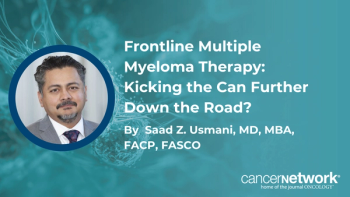
Qualitative Analysis Shows Peer Support May Offer Benefit to Those Undergoing Allogeneic HSCT
Semi-structured qualitative interviews revealed that patients undergoing allogeneic hematopoietic stem cell transplant could benefit from peer support prior to and during transplantation.
Peer support among patients undergoing hematopoietic stem cell transplant (HSCT) may offer benefit, especially if started prior to treatment, according to a study published in Bone Marrow Transplant.
Semi-structured qualitative interviews of patients following HSCT revealed that while most patients (70%) did not receive any type of peer support during their treatment, more than 4 of 5 (83%) expressed needs that may have been met if support was offered prior to the start of treatment.
“Despite limited access to peer support experiences for the majority of patients in our study, most participants were interested in both receiving and providing peer support,” the study authors who were led by Hermioni L. Amonoo, MD, of Dana-Farber Cancer Institute, wrote. “Participants also reported various potential benefits of peer support, including emotional support, management of expectations and uncertainty, and overall social support.”
The analysis included patients who received allogeneic HSCT, 12 of whom were 6 months or less post-transplant and did not have any complications and 13 were more than 6 months post-transplant and living with chronic graft-vs-host disease. Median patient age was 63 years (range, 22-73), most were White (80%), and the most commonly represented malignancy was acute myeloid leukemia (36%).
An interview guide was developed based on literature review and in consultation with qualitative research experts and aimed to hit on domains of experience and knowledge of peer support, peer support resources for HSCT receipt and recovery, intervention preferences and benefits, and considerations for peer support mentorship.
All participants involved expressed an understanding of peer support and defined it as connecting with someone who has also undergone HSCT, which may involve one-on-one or group interactions. Benefits of this type of support included management of distress, expectations, and uncertainty that are experienced by those undergoing HSCT.
Prior utilization of peer support was not common, with those who did connect reporting that their matches were not a good fit due to a large gap between their current experience and how far along their mentor was post-transplant. When asked about the ideal timing of initiation, 61% said they would have liked to begin peer support prior to transplant hospitalization as to manage expectations going into the experience.
Although some patients expressed that a few months of mentorship would be beneficial for the management of HSCT, others thought intervention for a year or more could be beneficial.
Connecting with others in-person was preferable to many of the participants, but the advantages of virtual calls were noted especially in the context of COVID-19. Additionally, although group meetings offer the benefit of accessing several individuals with diverse experiences, interaction with an individual allows for more intimate connection.
Some limitations of the study include a homogenous dataset, as most patients were White, married, educated, and received transplant at a tertiary academic medical center. Additionally, the study included only those who received allogeneic HSCT, whereas patients undergoing other cellular therapies may express different peer support needs.
“In conclusion, our qualitative study, which explores peer support experiences and preferences of patients with hematologic malignancies who have undergone HSCT, underscores numerous potential benefits of peer support in this population. Since a majority of our cohort expressed interest in engaging in peer support, both as recipients or providers of peer support, we highlight that peer support may be an underutilized resource in bolstering the psychological and social wellbeing needs of patients with hematologic malignancies or those who have undergone HSCT,” the study authors concluded.
Reference
Amonoo HL, Harnedy LE, Deary EC, et al. Peer support in patients with hematologic malignancies undergoing hematopoietic stem cell transplantation (HSCT): a qualitative study. Bone Marrow Transplant. 2022;1-10. doi:10.1038/s41409-022-01711-9
Newsletter
Stay up to date on recent advances in the multidisciplinary approach to cancer.






































